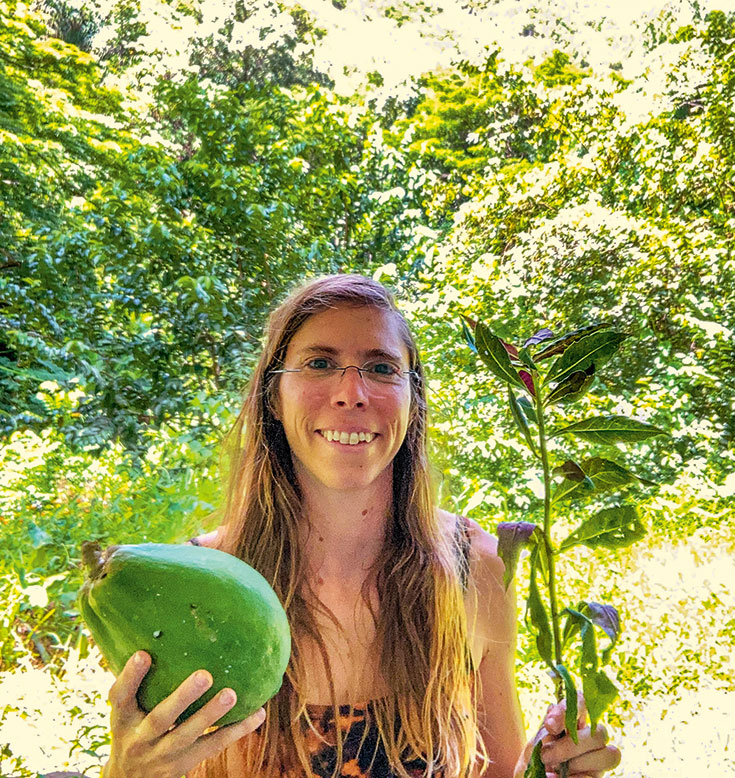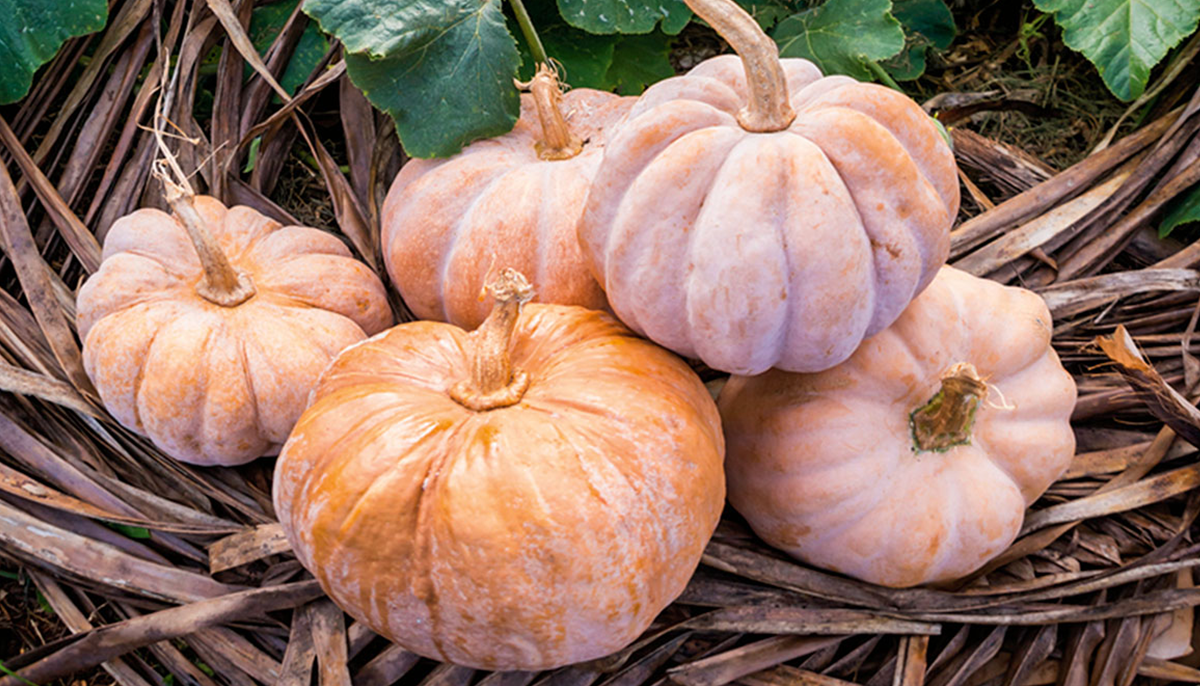“Hūi!” My neighbor Wanna’s voice makes a two-syllable birdsong out of the greeting. “I have bananas for you.”
The bananas are a pale emerald color, still firmly attached to the thick stem, and I accept them gratefully. Then we stroll around my ramshackle garden, inspecting the plants. Enormous papayas are hanging from the trees whose seeds Wanna helped me plant, and the blue ginger she gave me has shot up a beautiful leaf with a purple stripe down the middle.
Wanna and I make plans to raid a lilikoi patch later that day. We share a passion for the sour, seedy fruit whose yellow orbs look like children’s Easter eggs hidden in the leaves. We’ve hunted for them in the pouring rain, braved guard dogs to grab them from where they’ve gotten stuck in the cracks of stone walls, and scrambled down steep stream banks in near darkness to pluck them out of the water.
Food was currency in the valley, and now I too could show up with gifts.
When Wanna and I are foraging together, I feel the valley’s riotous abundance and hear its music in my ears. Walking home, heavy bags of fruit slung over our shoulders, I feel completely safe, contained within in the valley’s steep walls.
But this secluded part of Hawaii didn’t always feel like home. I was bereft the first time I walked the muddy acre that my husband and I bought off Craigslist sight unseen in a bid to start our lives over in a sunny climate. Our parcel was accessible only by foot, and I felt awkward trudging across our neighbors’ land to reach our place, my backpack bulging with supplies. Home was only a tent, and food was a handful of trail mix or a slurp of unrefrigerated yogurt. Mice quickly spoiled the rice we didn’t have the ability to store. I felt embarrassed by the squalor of our living conditions, and this made it difficult to make friends. I avoided neighbors. Instead of feeling embraced by the valley’s green cliffs, I felt trapped.
All that changed when Wanna showed up. She’d just returned from her annual sojourn in Thailand. The first time she hūi-ed us, I wondered if she’d be upset that we’d blown in and bought this land. Would she scold us for our ugly tent and even uglier truck, which we parked a half-mile away by the nearest road? Surely, stories about us had filtered their way to her. How we’d carried in a king-sized mattress through the swamp, staggering under its weight. How we’d put our tent under a monkeypod tree, where we could be killed by a falling branch in our sleep. How we’d bought land that everybody knew was uninhabitable.
Wanna carried a cutting of Okinawa spinach with thick leaves. I accepted it with a twinge of despair. Our land was so overgrown with invasive Java plum and African tulip trees that there was hardly any room to plant a garden. Still, as Wanna looked on, I pulled out a few weeds in a slightly less swampy part of our land and stuck the cutting in the ground.
I figured that Wanna, having given me and our campsite a cursory assessment, would leave my husband and me to burn ourselves out and disappear, as the previous owners of the land had done. Instead, I heard a hūi the next day. It was Wanna, carrying a baby banana plant. I protested that I didn’t have enough sun to grow bananas. There was so much clearing to be done before I could grow anything. Still, the baby banana plant was available now, so I planted it.

Soon, Wanna was coming over every day, often several times. She brought me papayas, taro, and eggs, rambutan, kale, and oranges. Sometimes I felt overwhelmed by the frequency of the visits—I worried we’d run out of things to chat about, or that I’d disappoint her somehow. I worried about being the recipient of so many gifts, having nothing to offer in return. But they were gifts I desperately needed. I gobbled up the fruit the moment Wanna went home, feeling the vitamins flow into my bloodstream.
While Wanna’s food gifts were all about nourishment, the plant cuttings she brought me exerted a gentle pressure. The kale starts needed sunlight, which meant clipping back the invasive trees. The baby banana needed to be protected from the wild horses roaming the valley, so I had to build a fence. The previous owner of the land had left behind fence posts and barbed wire, and I dutifully dug them out of the vines where they were hidden. Neighbors walking past commented favorably on my initiative, and for the first time since we came to the valley, I felt a sense of pride. I wasn’t merely inhabiting this place; I was forming a relationship with it.
The Okinawa spinach Wanna brought over became the first reliable source of food on our land. The banana plant grew tall in spite of the shade, and the pumpkin seeds exploded into a thriving pumpkin patch. One year after Wanna’s first hūi, our land was a place of beauty, and I was starting to feel I belonged.
Sometimes, Wanna chided me gently for my shyness. “You have to talk to people,” she said, dragging me over to the plastic picnic table where the longtime neighbors hung out in the evenings. I’d hurried past that table a hundred times. Now, I discovered the neighbors were happy to have a fresh audience to entertain with stories of their exploits fishing in the open ocean and planting taro under the full moon.
When Covid landed, neighbors I’d never met before, newly released from work and school, showed up to reestablish their families’ old loi’s—shallow ponds where freshwater taro is grown. I felt a spike of apprehension when I spotted trucks on a piece of land my husband and I had to hike through to access our own. Anxious thoughts ran through my mind. What if they said we couldn’t walk that way anymore? Disputes about access were common in the valley.
I puttered around my garden, casting nervous glances at the unfamiliar people. Then I thought about everything Wanna had taught me—the straightforward way she’d shown up, gift in hand, not knowing whether I’d be hostile or friendly. I hunted around my pumpkin patch until I found the two most attractive pumpkins. Tucking one under each arm, I marched to the fence close to the trucks.
“Hūi!” I sang out, abandoning myself to whatever came to pass. The strangers turned, their faces registering surprise.
“I brought some pumpkins for you,” I said, my voice shaking only slightly as I set my offering on a tailgate.
Walking home after exchanging introductions, I was filled with gratitude and wonder. Wanna had helped me survive a difficult time, but she’d also given me the tools to work out my own survival. Food was currency in the valley, and now I too could show up with gifts. I could show up in friendship, armed with pumpkins and plant cuttings, ready to establish a relationship with whatever awaited me on the other side of the fence.

